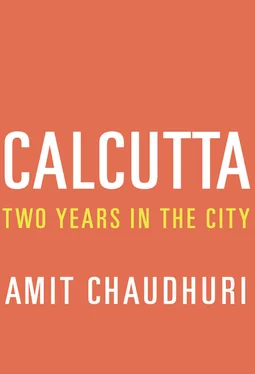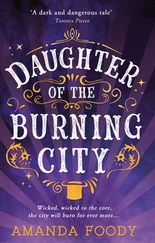“I have to get back,” she urged. “My brother …” Yes, to leave an infant alone in front of Oxford Bookstore … I’d put that thought out of my head. How would she go back to Forum later? On foot, she told me. Other beggars were listening; and, when they saw me fish in my pocket and give Shabnam her reward for humouring me, they advanced in a proprietary way, demanding money.
It was a lovely afternoon, of course, and an excellent time to be in Park Street — seven days before Christmas, which, with New Year’s Eve, would transmogrify the place with its paraphernalia and magic and leave its unmistakable trace there for pretty much the rest of the year. As for the beggars (mainly children and women), I knew they drifted around Flurys and Music World and the traffic lights as a matter of course — I felt I’d seen them before. This, though, was an illusion. Like everyone else on Park Street, they too were part of a whirl and itinerary of arrival and calculated lingering. People come to Park Street for a reason — to have a cup of coffee and forget the world; to try out a restaurant; to keep a business appointment; to become a couple; to study girls; to be a consumer — and once they’re done, they’re gone. The beggars, too, had their reasons for being here — they didn’t actually belong to Park Street. With the destitute, whom you hardly notice, you invariably make an assumption that they’re integral to the milieu and landscape they inhabit; as they don’t have a home, you presume their home is where they are. This wasn’t true of the beggars in front of Music World — like everything else (cars, shoppers, students, coffee drinkers) that made up the strange energy at that junction, they were ephemeral. Chance had brought me and them together, but, actually, there was no guarantee I’d run into them at this spot tomorrow.
I discovered this while talking to them. One woman in particular stood out: sparse-haired, large, in a colourful rag of a sari she’d wrapped round herself, she sensed why I was here and promised me a story. “Listen to me, dada!” she cried. “Not now!” I said, “tomorrow!” She made a sign of disgust. “I won’t be here tomorrow!” she said, and walked off.
The reason I was distracted was the other woman I’d begun to talk to over the din. She was plain-looking and reticent, and, in her way, I thought, lovely. She had a small boy with her. While the others asked for money, she asked for money to buy medicine— “Dada, oshudh kinbo” : a well-worn ploy. I countered this with “I won’t give you money, I’ll buy you the medicine,” to which, to my surprise, she nodded faintly and said, “All right.” Around this time the other woman warned me, “I won’t be here tomorrow!” and walked away, while I gestured to this young woman — she’d be in her late twenties — and her son to follow me to Free School Street, because there was a pharmacy there; as we waited to cross at the lights, and the other beggars quickly lost interest, I sensed that Park Street is, essentially (even for the destitute), a place of brief acquaintances and meetings — no one has too much time for anyone else, you yourself are part of a web of motivations that are fading and resurrecting — and you must be on the move constantly to be in the street’s ebb and flow of traffic.
We crossed the road — Christmas preparations were already on, and, at the turning of Free School Street, opposite the petrol pump, I saw a man walk past carrying a large cotton wool beard and an immense red suit: bits that would coalesce, at some point, into a figure of Santa.
At Ramayan Shah’s, I asked for the nearest pharmacy, as I had months ago when the boy had been lying on a shelf with clenched fingers, and, once again, someone pointed peremptorily ahead—“Aagey, aagey”—towards the right.
I had thought the woman was Bengali — she fitted perfectly with my childhood notion of the Bengali woman: pretty, intelligent-looking, fairly small, an embodiment of puritan dignity, with the straight hair combed into a bun on either side of her parting — but she was, to my surprise, originally from Bihar, and her name was Baby Misra. She said she was thirty years old; and she’d shown me a prescription on a doctor’s letterhead to vouch for the authenticity of her plea. I was right to think, though, that she wasn’t a beggar — she lived just outside of Calcutta, in Howrah — the graveyard of Bengal’s industry — and there she was a part-time domestic help, washing dishes and cleaning up at two homes in the morning, earning two hundred rupees monthly at one house, three hundred at the other. That left her afternoons free, and she’d embarked for Park Street at 1 p.m.
Marvelling at the journeys that had brought us to the front of Music World and the large glass windows of Flurys, I asked her, crudely, why she wasn’t begging in Howrah. She admitted, without any of the pride that was implicit in her simple appearance, that she didn’t want to be spotted by people she knew. Her journey to Flurys seemed to me, then, both entirely understandable and slightly mad; given she wasn’t so well — and despite her deceptive air of reasonableness.
Her husband, Munna, was now far away; he’d gone back to his des, as labourers in Calcutta do frequently, to a place that sounded — on Baby Misra’s tongue — like “Raksaul.” Jitinder, who was five years old, was clearly on an outing; he carried a little stick, probably to entertain himself or, in his own made-up universe, to protect himself and his mother. Like him, I too was not immune to the charms of Free School Street in December — a poor, dirty, congested road, with an open gutter on either side, but busy with insignificant enterprise, and with residues, everywhere, of an earlier bohemian life. I crossed the street and soldiered on — the pharmacy was not where I’d expected it, and bystanders kept promising, “Just there — further on”—while, doggedly, Baby Misra followed, with her son, confidently brandishing the stick, unimpressed by the crows and stray dogs. I was thinking that there was something else I was supposed to be doing, which I was being kept from, and my stride became more urgent; and then realised that this — whatever it was I was doing now on Free School Street — was exactly what I’d set out to do. “What is it that’s troubling you?” I asked her; she said, quietly, that she had a shooting pain in her right leg, a pain like a “current.”
Bihar, Bengal’s neighbour, has one of the grandest histories of all Indian provinces; home to India’s first great empire, to two great and austere religions, Buddhism and Jainism, and to the ancient teeming city of Pataliputra. It’s a world that the Indian child knows from comic books — the kingdom of Magadha; the resplendent emperor Chandragupta Maurya on his horse; the tonsured sages gathered round a holy tree; the sensuous women that the artists of the Amar Chitra Katha comic book series drew with lascivious satisfaction. While you glimpse that dreamworld of eternal India, you don’t make the connection, either as a schoolboy or as an adult, with Bihar, byword for abhorrent ministers and bureaucrats and policemen, minor warlords and ignorant peasants, whose once-poetic tongues — Bhojpuri and Maithili — now, spoken by the likes of Ramayan Shah, make people laugh. There’s no reason to think that the Biharis, who constitute a substantial percentage of the floating population of Calcutta, like the pompous remnants of the Bengali bourgeoisie at all, flattened by decades of left rule, or that the Bengali thinks of the Bihari as anything other than a rickshawalla. It’s a testament to Bengali self-absorption that the city is still fundamentally thought to be a Bengali one — although grudging concessions are made to the fact that the economy, now, is almost entirely controlled by Marwaris. But what of the Bihari? On Park Street and Free School Street, and in other parts of the city, he is everywhere; leaning out of a taxi window, eyes glazed, buying gutka from a vendor (who’s also, possibly, Bihari) to keep himself going for the rest of the day; or selling chanachur masala in front of a mall; engaged in small trade or the perennial construction work; living apart from his family, then mysteriously withdrawing to his des for a month.
Читать дальше












